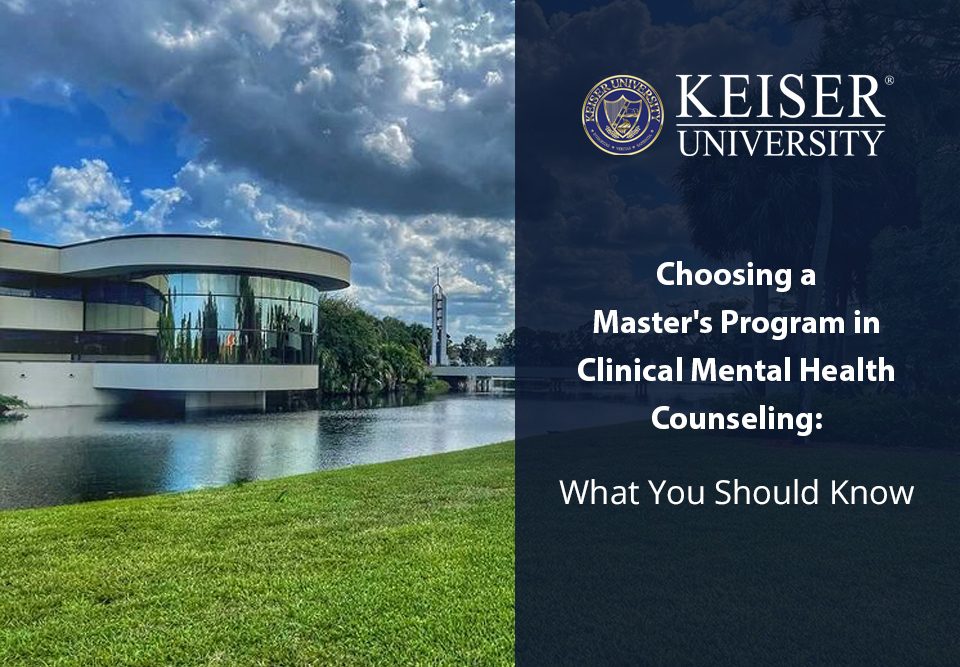Mental illness is a major issue in the United States, impacting people of every age and background. According to Mental Health America, nearly 20 percent of adults in the United States experienced at least one mental illness in 2022, the equivalent of about 50 million Americans. This doesn’t include the estimated 49.5 percent of adolescents who experience a mental disorder at some point in their young lives.
As a psychology, behavioral science, social work or human development professional, you want to do everything you can to fight the stigma of mental health and provide patients with the care they need. If you’re looking to advance on your career path, you might be interested in clinical mental health counseling graduate programs.
Why choose a clinical mental health counseling degree? With the right degree under your belt, you can gain the specialized knowledge and expertise needed to perform the role of a licensed counselor. Likewise, clinical mental health counseling master’s programs can help prepare you for appropriate state licensure as a licensed professional counselor (LPC) or licensed mental health counselor (LMHC).
Choosing a Clinical Mental Health Counseling Program
As you begin exploring clinical mental health counseling programs, there are a few things to consider, including degree requirements, admissions requirements and certification requirements.
Degree Requirements
Start by finding out exactly what is require for you to obtain your degree. Most master’s programs in clinical mental health counseling require around 60 credit hours at the graduate level, which amounts to about 20 courses. Depending on whether you enroll part or full time (and whether you have any applicable transfer credits), you can generally expect this type of degree program to take you three to four years to complete.
Most programs will also include some kind of practicum or internship requirement, completed toward the end of the program. These experiences count toward your credit hours, but it’s important to understand what the clinical requirements are for your program before you enroll.
Admission Requirements
Consider, too, the admission requirements and prerequisites you need to be accepted into a master’s program in clinical mental health counseling.
In most cases, you will need a bachelor’s degree or master’s degree in a related mental health field, such as psychology, behavioral science or social work. Depending on your GPA in your previous degree program and your school’s requirements, you may be required to take the Graduate Record Examinations (GRE) as part of the admission process.
Education and Certification Requirements
While a graduate program in clinical mental health counseling should prepare you for a career in professional counseling, it typically will not include formal certification or licensure. This is because each state sets its own requirements for licensed or certified counselors. If you have plans to work as an LPC LMHC, you’ll need to research and complete the certification requirements in your state upon earning your degree.
What Counseling Program Is Right for You?
Within the field of clinical mental health counseling, different specializations and concentrations may be available depending on the school and program you choose. While it is not necessary to choose a concentration, doing so can allow you to pursue your interests and tailor your studies to meet your career goals.
Counseling Specializations and Concentrations
Some concentrations that may be available in a clinical mental health counseling program include:
- Couples and family counseling
- Human sexuality
- Addiction and addictive behavior
If you’re interested in a particular concentration within the field, you’ll need to do your research and find a program that offers the specialization you wish to pursue.
Program Considerations When Choosing
In addition to factors like admissions requirements and program length, you’ll need to keep in mind the following when it comes to choosing the clinical mental health counseling degree that’s right for you:
Time Commitment
Most master’s programs in clinical mental health counseling will consist of around 60 credit hours, but this doesn’t mean that the time commitment involved in each program is the same. For example, a program that is offered entirely on-campus will require you to commute to school for class. Depending on how far you live from campus, this can quickly add up to a much larger time commitment than you may have realized. For those who are looking for an online option or have less time, Keiser University offers a Clinical Mental Health Counseling (CHMC) master’s online. Keiser’s Online CHMC program consists of 20 courses for a total of 60 credit hours, that are offered over 16-week terms. The program estimates 36 to 48 months to completion but can vary on a case-by-case basis.
Other factors can also affect the time commitment needed to complete a program, such as how often classes are offered and whether you’ll be enrolling part or full time. If you’re already working in the mental health field and have no plans to leave your job while you advance your studies, then part-time enrollment will be the best option for you.
Degree Cost and Tuition
Prospective students should also research and consider tuition and overall costs when choosing a master’s program in clinical mental health counseling. Pricing can vary widely from one program to the next—and with the average master’s degree in the United States now costing anywhere from $50,000 to $85,000, knowing exactly how much your chosen program will cost is critical to your financial planning.
Remember that the cost of a program goes beyond multiplying the cost per credit hour by the number of credit hours in the program. You’ll also need to account for other expenses that may include books and supplies, registration fees and technology fees. Some schools may also offer financial aid to those who qualify, so be sure to research your options if you need assistance paying for school.
Online vs. In-Person (Traditional) Program
Another crucial decision is whether you’d prefer an online or in-person program. There are certainly some advantages and potential drawbacks to each, but many busy professionals already working in the field and juggling other life obligations find that an online program is the most flexible and accommodating option available.
With an online degree program, you can work at your own pace while saving yourself the time and cost associated with commuting to campus. Meanwhile, you’ll receive the same quality education with the same learning outcomes as an in-person program.
Process of Choosing a Counseling Program
Still not sure which master’s program in clinical mental health counseling is right for you? Break down your decision-making process into a series of steps to help you make a more confident decision.
Define Your Goals
Start by defining your goals. Aside from formal credentials, what are you looking to get out of your graduate program? What areas of specialization are you most interested in? Once you have a better idea of what your short- and long-term goals are, you can better evaluate each program’s curriculum and outcomes to determine which program is right for you.
Research Programs
As you begin your research, the first thing you’ll probably notice is that there are a lot of schools that offer graduate programs in clinical mental health counseling. You might initially feel overwhelmed by the available options, but as you start narrowing down viable candidates based on admissions requirements, financial aid options and areas of specialty, you’ll have an easier time deciding which are worth exploring further.
Placement and Student Reviews
Student reviews can be especially helpful as you explore clinical mental health counseling programs. Ideally, you’ll want to look at third-party websites with reviews from real students who have participated in the programs you’re considering. Taking the time to read student reviews can help you get a better feel for what the program experience may be like, helping you make a more confident and informed decision.
Compare Program Specifics
No two clinical mental health counseling programs are identical, so be sure to compare program specifics carefully. Look at the detailed curriculum that includes the required coursework and any clinical experience that may be required. Be sure to consider which programs are offered online versus in person. Some programs may even be offered in a hybrid format (where some coursework is online and some is in person), which may help you narrow down your options even more.
Apply and Enroll
Whether you decide to apply to just one program or multiple programs, it’s important to carefully review the admissions requirements and follow them closely. Be sure to give yourself plenty of time to gather any application materials you may need, especially if you need to take the GRE or submit personal statements and letters of recommendation.
After you apply and receive your decision, the next step will be to enroll in the program of your choice. Enrollment dates can vary depending on how often new classes start, so you may be able to enroll immediately or must wait until the next semester starts. To optimize your experience and ensure you’re taking the right classes, consider seeking help from a program advisor.
Ready to Get the Ball Rolling?
Choosing a clinical mental health counseling graduate degree program isn’t a decision to take lightly. Not all programs are created equal or offer the same quality education and enrichment opportunities. This is why it’s so important to explore specializations, decide on your ideal program format and carefully consider your options before you apply and enroll. From there, you’ll be able to work toward your degree (and long-term career goals) with more confidence.
At Keiser University, our Master of Science in Clinical Mental Health Counseling offers the tools and insights you need to pursue professional opportunities throughout the counseling field. Likewise, when it comes to accreditation of counseling, Keiser University is accredited by the Southern Association of Colleges and Schools Commission on Colleges.
Interested in learning more about this program or any of our other graduate-level programs? Speak with a graduate admissions counselor to take the next step today!






 My instructors believed in me. They were more than instructors, they tried to get to know you as a person and tried to understand your goals so they could push you towards them. Student services helped me find a job before I even graduated. Everyone was dedicated to my overall success.
My instructors believed in me. They were more than instructors, they tried to get to know you as a person and tried to understand your goals so they could push you towards them. Student services helped me find a job before I even graduated. Everyone was dedicated to my overall success.
